Patrick Cumby's Blog
May 29, 2025
Troody and the Ghast
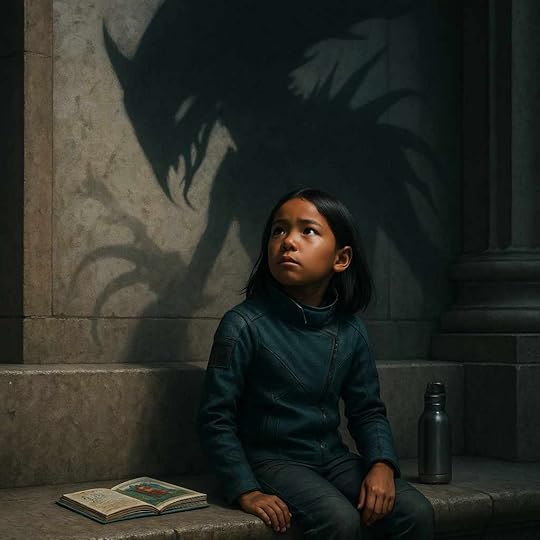
This short story is set in the Legends of the Known Arc universe. If you enjoy it, please share! Also, drop me a note and let me know what you thought.
When eight-year-old Gertrood Littlefeather is left waiting outside a tense courtroom, she doesn’t expect to meet a real Ghast — one of humanity’s oldest enemies. But as protestors rage and danger creeps closer, Troody discovers that monsters aren’t always what they seem… and sometimes, the scariest thing in the hallway might be justice itself. A tale of innocence and courage in the shadow of interstellar politics.
I met a Ghast today.
Dad was away, and my usual sitter Hann had a doctor’s appointment, so Mom had to take me to the courthouse with her. The courthouse was a big stone building. We went inside and she put me on a big stone bench in a big stone hallway between two of the big stone pillars and told me, no matter what, that I was to stay on the bench and not get up for any reason, any reason at all, until she came for me. She told me not to talk to anybody, to just sit quietly.
I asked for her komnic so that I could play Jullop Beans but she said, no, she’d need it. She gave me a bottle of water and a snackbox and a book to read. A stupid kids book. She kissed me on the head and smiled, but she’d been mumbling all morning, and I knew she wasn’t in a good mood. Big things were happening at the courthouse today, and she certainly hadn’t planned to bring me with her.
Mom looked back twice before she went through the tall metal doors into the courtroom, once to smile and give me a little wave, and then again just before the doors closed behind her, when she thought I wasn’t looking. That time she wasn’t smiling. She looked sad, and scared, which scared me.
I don’t ever cry. Well, that’s not exactly true. I hardly ever cry. I didn’t cry then, although I thought about it. Maybe I cried a little inside my head, but nobody could see it on my face.
I opened the book and held it in my lap and stared at it like I was reading, only I didn’t read it. I just stared at it. Maybe if all the strangers hurrying up and down the big stone hallway thought I was reading a book, they wouldn’t stop to bother me. People reading books in public places are practically invisible. Nobody ever got killed or kidnapped or anything while they were reading a book. Not ever. Just try to remember the last time you saw somebody in public sitting quietly, reading. Bet you can’t, because they were invisible.
But I was only pretending to read, which, now that I think about it, meant I actually wasn’t safe.
Without looking up from the pages, I listened. The hall was gigantic and echoey, filled with footsteps and doors opening and closing and people whispering. Even when the people whispered, which they all did, the echoes made their whispers scary. They were all in a hurry. Nobody was smiling. I didn’t look up; I could just tell that nobody was smiling. I could tell by the way they walked, and the way they whispered. Nobody who walks fast and whispers is ever happy.
Mom told me not to worry, that she was only here to talk to a judge about some bad people and the bad things they were doing, but I’m not stupid. Mom is a troublemaker. At least, that’s what Dad always says. He’s usually laughing when he says it, but sometimes I see him wince, and sometimes at night, like last night when they thought I was asleep, I hear them arguing:
Dad: You can’t do this. Promise me you won’t do this.
Mom: I have to. If I don’t, then who will?
Dad: There’s a reason nobody is willing to represent them. The local Consenti, and even the Father Regis, supports the relocation of their villages.
Mom: Of course they do. The Church technically owns their whole planet. They stand to make a fortune in corporate tithes if the core mines are allowed to open.
Dad: But it’s hopeless. How do you expect—
Mom: It’s not hopeless! Gods damn it, it’s not! There are a lot of people trying to protect the forests and seas of Colladum, and even more who are sympathetic to the indigenous population. If we can convince them to speak with one voice—
Dad: But it’s the Church. You can’t go against them.
Mom: Why not? Even the Consentis are afraid of public opinion.
Dad: Consentis aren’t afraid of anything.
Mom: That’s where you’re wrong. If I can get the news media to pay attention and get the word out about what’s happening on Colladum, the masses will respond.
Dad: Gemma, think about what you’re saying. You can’t afford to make enemies in the Regia Curia. Those guys are powerful. Things… happen to people who oppose them.
I usually don’t understand what they’re talking about, but last night I heard the fear in Dad’s voice, which scared me, and I heard the determination in Mom’s voice, which also scared me but also made me feel a little proud.
I wasn’t so proud sitting on the big stone bench. My feet didn’t reach the floor and I was starting to get hungry and all I wanted was for Mom to come out of that courtroom and take me home.
One set of the echoey footsteps was getting slower as it approached. I swallowed and tried not to breathe too fast. The footsteps stopped. I didn’t look up from my book, but I could tell when somebody sat down on the big stone bench just across the big stone hallway, facing me.
I really stared at the book. After a while I realized that I should probably turn the page every once in a while so as not to look suspicious. I mean, who just sits and stares at the same page forever? Only a weirdo would do that.
I started to hyperventilate a little. That means I was breathing too fast. I get dizzy sometimes when I hyperventilate. I do it when I’m really scared, but also when I’m really excited.
Don’t hyperventilate, Trood, Dad is always saying to me. He thinks it’s funny, but it’s not. I looked it up on Mom’s komnic. It’s a real thing. It causes the brain to get drunk on too much oxygen. Dad says I’m excitable. He says I get it from Mom.
I tried to imagine Dad sitting next to me. He’d probably be poking me in the ribs and pointing out the people in their fancy clothes as they walk down the big stone corridor. He’d be whispering funny things about them to make me laugh. He says my laugh is like sunshine sparkling through raindrops. I told him once that the sun never shines when it rains, but then he made me look up rainbows on the wiki and I had to admit I was wrong. Turns out that sometimes it rains and it’s sunny, all at the same time. And that’s when magic happens, according to Dad.
Thinking of Dad calmed me down a little. I put the book down on the stone bench next to me. Without looking away from it, I reached for the snackbox. The paper crinkled, and the noise scared me, and I jumped a little and bumped my water bottle.
That was a huge mistake.
The metal water bottle fell to the stone floor and made the loudest crashing noise ever in the history of the whole universe that echoed all the way down to both ends of the corridor and then reflected and echoed again and again. I squeezed my eyes shut but then I could hear the bottle rolling and rolling across the big stone hallway, bumping loudly across the uneven stones, and the sound lasted forever and ever…
It stopped.
I cracked open one eye and squeaked a glance across the hall. My water bottle had stopped rolling because there was a boot on it. The boot belonged to the stranger sitting across the hall. I stared at the boot, afraid to open my eyes any wider. I was a weird boot. Funny looking.
The boot lifted, and then a hand came down to pick up the bottle.
No, not a hand.
A claw.
I slammed my eye shut and I stopped hyperventilating. I was too scared to breathe at all.
I didn’t move.
The stranger with the claw spoke. In a whisper, like everyone else. It was a weird whisper, though.
Not human.
“Excuse me, little larva, but you dropped your water.”
I didn’t move. A long time passed, and I started to feel weird and then I remembered I wasn’t breathing, so I took a breath as silently as I could, without moving a muscle.
Then, strangely, the most unexpected noise ever.
My water bottle was rolling again, across the hall.
Toward me.
It bumped against my foot.
I gasped.
“It’s okay. You can pick it up,” the stranger whispered.
I cracked open one eye again, just enough to see the bottle next to my shoe. It looked normal.
I took a deep breath, opened my eyes. And looked up at the stranger.
I closed my eyes again, but I didn’t scream. I mean, I might have let out a little mousy squeak, but it wasn’t loud enough to echo.
The stranger across the hall was a Ghast.
A real, live Ghast.
“Thank you,” I whispered quickly, because everybody knows you’d better be nice to a Ghast.
Ghasts eat people. Humans, like me. At least they used to, back when the Ghast and the Earthlings were at war.
But that was a long time ago. They don’t eat people anymore.
Do they?
I opened one eye.
It was looking at me. I could tell it was looking at me because one of its two slimy eyepods was pointed straight at me.
I opened my other eye.
It extended its second eyepod.
We stared at each other with both our eyes.
“Aren’t you going to pick up your water?” it whispered.
I swallowed and picked up my water bottle.
“Thank you,” I said again.
“Why are you alone? A larva should never be left alone.”
“I’m not alone,” I whispered.
It rotated one of its eyepods to scan the hallway.
“Where is your clan mother?”
I swallowed and pointed to the closed doors of the courtroom.
It made a funny wave of its eyes.
“I see.”
I swallowed again and worked up my courage.
“What’s your name?”
“My name is Bin’Dreik,” it said.
“You’re a Ghast,” I said.
“You are very observant,” it said.
“Are you a girl or a boy?” I asked.
“I am neither,” it said. “But you may call me a she.”
I thought about that for a minute.
“Do you eat… people?”
“I have never eaten a human. But some of my grandmothers did, back in olden times. I hear humans are delicious.”
I couldn’t tell if she was joking or not. I sat for a long time. A policeman walked by. He looked at the Ghast, then at me.
“Are you okay?” the policeman asked me.
“I’m fine.” I said.
“Are you alone?”
“No, my mother is in there,” I said, and pointed at the big doors.
The policeman looked at the doors and then back at me. “Is your mother Gemma Littlefeather?”
I nodded.
“Thought so. You look just like her.” The policeman looked sad and let out a sigh. “Your mom is a nice lady. Let me know if you need anything.” He looked at the Ghast. “Is this thing bothering you?”
“No, she’s nice, too,” I said.
The policeman grimaced. He turned to the Ghast and said, “I’m watching you. Keep your filthy claws to yourself.”
“Of course,” said the Ghast.
The policeman grimaced again, but he walked away.
The Ghast wiggled her eyepods at the policeman’s back. This made me giggle.
“Are you afraid of me?” she asked.
“A little bit,” I said.
“Ah, don’t be. A Ghast would never hurt a larva. Not even a human larva.”
“I’m not a larva. I’m a kid.”
She made a laughing sound, except that instead of coming from her mouth, it came from tiny little air holes all over her body.
“What’s your name,” she asked.
“Troody Littlefeather. It’s short for Gertrood.”
“It is my pleasure to meet you, Troody Littlefeather.” She dipped an eyepod toward my book. “What are you reading?”
“I wasn’t really reading,” I confided. I explained my theory about how nobody ever got killed or kidnapped or hurt or anything while they were reading a book.
“Hmm,” she said. “You may be correct. I will make a note of that.”
I nodded knowingly. She nodded back at me. She pointed toward my snack.
“Are you going to eat that?”
“Maybe,” I said.
“What is it?”
“It’s a schlith sandwich with chips. And a pickle.”
“Very nice. What’s a pickle?”
I opened the snackbox and held up the pickle. “Want some?” I offered.
The Ghast made a weird motion with her eyestalks. She stood up. She was really tall. I wasn’t expecting her to cross the hall and sit next to me, but that’s what she did. She was scary for a minute but she sat all the way at the other end of the big stone bench, a long way away.
She held her arm out. It was very long. Her hands were big and bony, too.
“I will try some… pickle,” she said. “Just a small piece.”
“You smell weird,” I said. “Do all Ghasts smell like you?”
“Humans smell… weird… to us Ghasts, too,” she said.
“Like, do we smell… bad?”
“Sometimes,” she said.
“Do I smell bad?”
She made a sniffing sound through all the tiny little holes in her crusty skin.
“You smell just fine,” she said. “Mostly, I smell that pickle.”
I broke the pickle in half and handed her a piece. She used the two biggest claw fingers on her hand to take it from me. She was very careful.
I held up my half of the pickle and took a bite. She put her half up to her mouth. Instead of a regular mouth with lips and teeth and a tongue, she had two sets of pointy fangs and a bunch of weird and gross little finger-thingies inside the hole behind the fangs.
My half of the pickle was crunchy. I love pickles. Dad says I’m a pickle monster.
The Ghast crunched on her half of the pickle.
“Interesting,” she said.
“Do you like it?”
“I like it very much,” she said.
I guess that made her a pickle monster, too. An actual pickle monster. A monster who likes pickles. I wished Dad were here. He’d love this.
A noise came from behind the courtroom doors, like all of a sudden the people inside were all shouting at each other. Everybody walking and whispering in the hallway stopped walking and whispering and looked toward the doors. There were two policemen guarding the doors. One of them was the same man who’d talked to me earlier. He looked in my direction. I waved at him. He smiled back at me, but then he frowned. Maybe it was because he saw the Ghast sitting next to me. Or maybe it was because of the shouting people inside the courtroom.
The Ghast was looking at the doors, too, with both her eyepods. She flicked her eyepods down and they disappeared into little holes in her head, then they popped back up. Was that how Ghasts blinked?
All of a sudden the doors to the courtroom opened. One of the two tall doors slammed into the wall, and the policeman on that side had to jump out of the way.
A man ran out, followed by more policeman. He was screaming something. The policemen all jumped on him. They all fell, right in the middle of the hallway. The man was fighting the policemen.
“Justice for the innocent!” the man screamed. “End the hegemony of the Church!”
The man broke free and started running down the hallway. Toward me.
The Ghast stood up and stepped into the man’s path. The man saw her and stopped dead in his tracks. His face went white. One of the policemen hit the man and he stopped screaming. The man fell to the ground and moaned. The other policemen all jumped on him. One of them put cuffs on his hands.
I realized that I’d stopped breathing again. I gasped a breath.
Somebody yelled, “Troody!”
It was Mom. She was running through the courtroom doorway towards me.
She saw the Ghast standing in front of me, and she stopped, too.
“Troody!”
I ran past the Ghast to Mom. She picked me up. She never picked me up because I was too heavy and Mom is a small woman, but that time she did it anyway.
“Are you okay?” She was asking me, but she was looking at the Ghast.
“I’m okay. Who is that man? Why is he yelling?”
She relaxed a little. “He’s a protester. He’s loud, but he won’t hurt anybody.”
“He’s scary,” I said. The police were escorting him away. He was struggling and still shouting.
“Justice for the innocent!”
Mom put me down. I held her hand. She turned to the Ghast.
“Bin’Dreik. So nice to see you again.”
“I am honored, as always,” said the Ghast.
“I was hoping you’d make it this morning,” Mom said.
“I was delayed by security. They are not accustomed to my kind here. They had to contact my embassy to verify my credentials. It took all morning. By then they’d sealed the courtroom.”
“I’m so sorry.”
The Ghast did a little shrug. “It would be the same for you on my homeworld. There, it is Earthlings who are the monsters.”
Mom made a little bow. She looked down at me and squeezed my hand. “You met my daughter?”
“I did,” said the Ghast. “She is very kind and brave. She shared her snack with me.”
Mom gave me an unbelieving look.
“She likes pickles,” I said.
Mom turned to the Ghast.
“It’s true,” the Ghast said. “Quite delicious.”
The policemen with the screaming man had pulled him through some doors at the end of the big stone hallway, but I could still hear him screaming.
Mom looked at me. “I’m sorry Trood. I’m calling my friend Geen to come pick you up. I should have done that in the first place. I didn’t think it would take this long.”
“Are you kidding me, Mom? This place is cool.” I pointed to the Ghast. “Plus, I got to meet a Ghast!”
Mom laughed. “Yes, you did. Still, I’m calling Geen.” Mom turned to the Ghast. “As you know, this was supposed to be a preliminary hearing, but the defendants just dropped an evidence bomb on us. Your testimony as an expert is more important than ever.”
“It’s why I am here,” said the Ghast.
“Did you bring the relic?” Mom asked.
The Ghast patted a small lump in the wrap that covered her waist.
Mom looked relieved. “Good. Come back inside with me. Are you okay with addressing the judges directly?”
“I am.”
Mom looked uncomfortable.
“They will want to see the relic.”
“I know. I am prepared.”
Mom nodded. Then she grinned. “They aren’t expecting a Ghast, you know.”
“Nobody ever expects a Ghast,” the Ghast said.
“We’re starting again, Counselor Littlefeather,” said the policeman from the courtroom door.
Mom squeezed my hand. “Troody, will you be okay for just a few more minutes? It won’t take Geen very long to get here.”
I pulled my hand away, even though I didn’t really want to. “I’m good, Mom. Really.”
Mom smiled, then got a naughty look. She turned to the Ghast.
“Do the thing for Trood,” Mom said. “Like you did for me.”
The Ghast looked around. “The thing? Here? Are you sure?”
Mom nodded. She squeezed my hand even harder, and whispered, “Watch this. Don’t be scared.”
The Ghast inhaled through all her little breathy-holes.
Then, boom! Before I could move or say anything, the Ghast changed. Her whole chest and shoulders exploded into a million little pointy blades as long and shiny as kitchen knives. Her eyestalks dropped into their little holes and her whole head hinged open at the back. Great big yellow lumps, like balloons, swelled from the sides of her neck. The fangs and the gross little finger thingies in her mouth-hole opened wider than I would have though possible and deep in her throat I could see rows and rows of great big pointy shark’s teeth.
Then, boom, as fast as she’d changed, she changed back.
I swallowed. Hard.
“Wow,” I squeaked.
“Do that in the courtroom if the opposing counsel tries to interrupt you,” Mom said to the Ghast. “Their lead is an asshole.”
“I will not,” said the Ghast.
Mom laughed. “Too bad.” She leaned down to me. “We have to go. I’m calling Geen right now. Will you be okay for ten more minutes?”
I looked around at all the strangers in the hallway. All their fast walking and all their whispers had stopped. They were all standing still, frozen, all staring at me, Mom, but mostly the Ghast.
“Don’t worry, Mom. I don’t think anybody will ever mess with me again,” I said.
Story copyright Patrick Cumby 2025
Read More…Journey into the dark heart of the machine–and the farthest reaches of the galaxy…
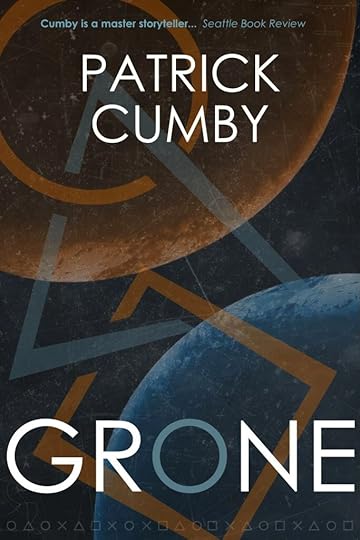 GRONE: Legends of the Known Arc Book One
GRONE: Legends of the Known Arc Book OneScience Fiction | 672 pages |
audiobook 22 hours
Tap image for ordering information.
“Kinetic and sharply written [with] spirited, impressive worldbuilding [and] a stellar cast of characters.”
-Kirkus
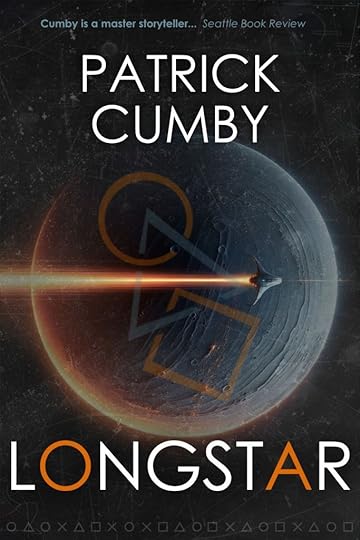 LONGSTAR: a novel of the Known Arc
LONGSTAR: a novel of the Known ArcScience Fiction | 693 pages
Tap image for ordering information.
“Epic… great depth and ambition… not your average sci-fi yarn.”
– Manhattan Book Review
.
April 28, 2025
Do I use AI as a writer? Yes, absolutely, and here’s why (and how…)
Here’s a question: as a writer, as an American, as an Earthling, should I be excited by AI, or afraid of it?
The answer is: Yes.
I’ll admit I am an enthusiastic user of AI systems. Their capabilities are astonishingly useful to a self-published author who takes his book business seriously. Any business owner in any domain, whether an author or artist or plumber or architect or arborist would be a fool not to use every ethical and moral tool available to them to promote and grow their business. AI is no exception.
Wait. I said “ethical” and “moral,” didn’t I?
And that’s a dilemma: Is using AI ethical? Moral?
Is a knife ethical? Yes, when used by a chef to slice the asparagus she’s serving her customers. No, if she uses it to murder the chef at a competing restaurant.
Is a pen ethical? Yes, if you use it to record a recipe for apple pie. No, if you use it to write political propaganda that purposefully incites violence.
Like any tool, it depends entirely on how you use it.
AI is the most disruptive technology ever invented. I’m a sci-fi writer and a student of history and I believe there has never been a societal game-changer like AI, not since the taming of fire or the discovery of the wheel or the birth of democracy. AI is going to utterly transform everything about the way we live and work. Utterly.
So, is AI going to destroy the livelihoods of millions?
Yes. If I was a technical writer or commercial artist, I would be, right now, looking for a career change. If I was a factory worker or lawyer or taxi driver or mailman or surgeon I would be questioning my career choice. And it won’t be long, a decade or two max, especially combined with advances in robotics, that no job on Earth other than esoteric fine arts won’t be done better by a machine.
Is AI going to be used by power-hungry nefarious actors to trick us, to make us believe falsehoods, to promote horrific values and impose their wills upon the rest of us?
Yes. It’s already happening. And it is proving to be very, very effective. As it stands, we are at the mercy of the bad guys. Just read the news.
So why, Mr. Sci-Fi Writer, would you use AI if it’s so awful?
Two reasons. First, because it’s here to stay, and if the good guys don’t learn how to use it for good, the bad guys will monopolize its awesome potential. Second, properly trained and regulated, it has just as much power to do good as it does to do bad.
It’s as simple as this: If you refuse to use AI for moral or ethical reasons, you are going to be overrun by those who do.
You might not want to admit it, but you know this is true. Don’t shoot the messenger. Trying to run a competitive business these days without using AI is like going into battle with pitchforks and shovels against a platoon of US Marines armed with M27 rifles and grenade launchers.
So, how can I as a writer use AI ethically and morally and not contribute to the problem or make things worse?
I struggle with this question every day, and the answer is about as clear to me as the waters of a swamp bog. For now, I use the following self-imposed rules (which change as I learn more about the technology). You may or may not agree with them, and I’d like to hear your opinion.
My rules for using AI in my writing and publishing work:
I do the writing. My stories and novels are written by me, not AI. The characters and plots and structures and outlines are made by me, not AI, painstakingly and manually diagrammed on whiteboards and restaurant napkins and the backs of power bills, whatever is handy when inspiration strikes. I don’t use AI for creative purposes because I want all of the juices in my writing to be my own flavors, and I don’t want to become dependent. Plus, AI-generated fiction still sucks…for now.I will employ humans for most aspects of book production. I will always use human editors for the final edits (though I am starting to use the built-in AI in my word processor for simple proofing tasks, such as grammar and spell checks). I will always employ human narrators and actors and engineers for audiobook production (although the new crop of AI tools that mimic human voices are getting scarily good). I pledge to always employ human narrators and editors because, well, it’s the right thing to do, and I love collaborating with other creative people on projects (note that in the past two weeks Amazon just made it possible for authors/rightsholders to create an AI-voiced audiobook of any book in their catalog, which will be a huge blow to voice actors).I will use AI for marketing and sales materials and analytics. I can’t sell my books without compelling advertising, and a key component of any online ad is an eye-catching image. I literally cannot compete in such a crowded marketplace without leveraging AI tools for image creation, mainly because everyone else is using them too. Similarly, AI does an incredible job of pulling together my sales reports, royalty statements, website activity, advertising invoices, and other marketing data to provide me with simple monthly business reports that are indispensable. I would have to hire a data analyst, which I could never afford, to give much these reporting insights.I will advocate for hardcore AI regulation and control. The only thing that will prevent AI from displacing jobs and being misused to create societal discord are laws to prevent its abuse. But let’s face it, our lawmakers are essentially clueless because, well, we are all clueless at this early stage in the game. Nevertheless, we must begin the process of defining rules for AI that will protect the public, protect jobs and protect our values as a people.I freely admit that I could be wrong in my positions about AI, and I stand ready to change my views as things develop…
…but at the end of the day, it comes down to this: we are standing on the shore of an foreign ocean we cannot yet comprehend. The waves are coming whether we want them or not. We can’t stop the tide. But we can choose what kind of sailors we want to be. We can lash our little boats together, learn to navigate the unknown waters with courage and conscience, or we can let ourselves be swept away by currents we refused to understand.
I don’t have all the answers. I know only that standing still isn’t an option. We must move forward — thoughtfully, consciously, using these powerful new tools with care and conviction. Not because we as writers want to join the AI juggernaut, but because if we don’t, we abandon the waters to those who will shape the future without regard for anyone but themselves.
Patrick Cumby, April 2025
If you’d like to read more about artificial intelligence, check out The single most important question of our time: Who will teach AI the difference between right and wrong?
Do I use AI as a writer? Yes, absolutely, and here’s why…
Here’s a question: as a writer, as an American, as an Earthling, should I be excited by AI, or afraid of it?
The answer is: Yes.
I’ll admit I am an enthusiastic user of AI systems. Their capabilities are astonishingly useful to a self-published author who takes his book business seriously. Any business owner in any domain, whether an author or artist or plumber or architect or arborist would be a fool not to use every ethical and moral tool available to them to promote and grow their business. AI is no exception.
Wait. I said “ethical” and “moral,” didn’t I?
And that’s a dilemma: Is using AI ethical? Moral?
Is a knife ethical? Yes, when used by a chef to slice the asparagus she’s serving her customers. No, if she uses it to murder the chef at a competing restaurant.
Is a pen ethical? Yes, if you use it to record a recipe for apple pie. No, if you use it to write political propaganda that purposefully incites violence.
Like any tool, it depends entirely on how you use it.
AI is the most disruptive technology ever invented. I’m a sci-fi writer and a student of history and I believe there has never been a societal game-changer like AI, not since the taming of fire or the discovery of the wheel or the birth of democracy. AI is going to utterly transform everything about the way we live and work. Utterly.
So, is AI going to destroy the livelihoods of millions?
Yes. If I was a technical writer or commercial artist, I would be, right now, looking for a career change. If I was a factory worker or lawyer or taxi driver or mailman or surgeon I would be questioning my career choice. And it won’t be long, a decade or two max, especially combined with advances in robotics, that no job on Earth other than esoteric fine arts won’t be done better by a machine.
Is AI going to be used by power-hungry nefarious actors to trick us, to make us believe falsehoods, to promote horrific values and impose their wills upon the rest of us?
Yes. It’s already happening. And it is proving to be very, very effective. As it stands, we are at the mercy of the bad guys. Just read the news.
So why, Mr. Sci-Fi Writer, would you use AI if it’s so awful?
Two reasons. First, because it’s here to stay, and if the good guys don’t learn how to use it for good, the bad guys will monopolize its awesome potential. Second, properly trained and regulated, it has just as much power to do good as it does to do bad.
It’s as simple as this: If you refuse to use AI for moral or ethical reasons, you are going to be overrun by those who do.
You might not want to admit it, but you know this is true. Don’t shoot the messenger. Trying to run a competitive business these days without using AI is like going into battle with pitchforks and shovels against a platoon of US Marines armed with M27 rifles and grenade launchers.
So, how can I as a writer use AI ethically and morally and not contribute to the problem or make things worse?
I struggle with this question every day, and the answer is about as clear to me as the waters of a swamp bog. For now, I use the following self-imposed rules (which change as I learn more about the technology). You may or may not agree with them, and I’d like to hear your opinion.
My rules for using AI in my writing and publishing work:
I do the writing. My stories and novels are written by me, not AI. The characters and plots and structures and outlines are made by me, not AI, painstakingly and manually diagrammed on whiteboards and restaurant napkins and the backs of power bills, whatever is handy when inspiration strikes. I don’t use AI for creative purposes because I want all of the juices in my writing to be my own flavors, and I don’t want to become dependent. Plus, AI-generated fiction still sucks…for now.I will employ humans for most aspects of book production. I will always use human editors for the final edits (though I am starting to use the built-in AI in my word processor for simple proofing tasks, such as grammar and spell checks). I will always employ human narrators and actors and engineers for audiobook production (although the new crop of AI tools that mimic human voices are getting scarily good). I pledge to always employ human narrators and editors because, well, it’s the right thing to do, and I love collaborating with other creative people on projects (note that in the past two weeks Amazon just made it possible for authors/rightsholders to create an AI-voiced audiobook of any book in their catalog, which will be a huge blow to voice actors).I will use AI for marketing and sales materials and analytics. I can’t sell my books without compelling advertising, and a key component of any online ad is an eye-catching image. I literally cannot compete in such a crowded marketplace without leveraging AI tools for image creation, mainly because everyone else is using them too. Similarly, AI does an incredible job of pulling together my sales reports, royalty statements, website activity, advertising invoices, and other marketing data to provide me with simple monthly business reports that are indispensable. I would have to hire a data analyst, which I could never afford, to give much these reporting insights.I will advocate for hardcore AI regulation and control. The only thing that will prevent AI from displacing jobs and being misused to create societal discord are laws to prevent its abuse. But let’s face it, our lawmakers are essentially clueless because, well, we are all clueless at this early stage in the game. Nevertheless, we must begin the process of defining rules for AI that will protect the public, protect jobs and protect our values as a people.I freely admit that I could be wrong in my positions about AI, and I stand ready to change my views as things develop…
…but at the end of the day, it comes down to this: we are standing on the shore of an foreign ocean we cannot yet comprehend. The waves are coming whether we want them or not. We can’t stop the tide. But we can choose what kind of sailors we want to be. We can lash our little boats together, learn to navigate the unknown waters with courage and conscience, or we can let ourselves be swept away by currents we refused to understand.
I don’t have all the answers. I know only that standing still isn’t an option. We must move forward — thoughtfully, consciously, using these powerful new tools with care and conviction. Not because we as writers want to join the AI juggernaut, but because if we don’t, we abandon the waters to those who will shape the future without regard for anyone but themselves.
Patrick Cumby, April 2025
If you’d like to read more about artificial intelligence, check out The single most important question of our time: Who will teach AI the difference between right and wrong?
April 22, 2025
The single most important question of our time: Who will teach AI the difference between right and wrong?
How do I feel about artificial intelligence? It’s like asking how I feel about fire. Warmth, light, destruction, it all depends on who strikes the match.
Knowledge is power, and we’ve invented a thing that has all-knowledge. In many ways AI is already smarter than all of us combined. It thinks uncomprehendingly fast, instantly sensing connections and patterns in all that knowledge that we could never perceive with our plodding meat-brains. AI systems are already penetrating the secrets of the universe with unheralded speed and efficiency, revealing layers of scientific knowledge that we would never have found on our own, knowledge that could revolutionize our existence for the better. In contrast, AI systems are also already being employed by the power-hungry to confuse us, to misdirect us, to blind us to truth.
It may sound like alarmist hyperbole, but I want to be clear: I believe the current crop of AI systems are as close to god-like entities as humanity has ever encountered, and we are only at the infancy of their potential capabilities.
Will they control us? Will they empower us? Will they destroy us? Will they save us? Will they replace us?
Or will they become us?
I don’t know. Neither do you—and if somebody on X or TikTok or YouTube or in the halls of government tells you they know, they’re either lying or hopelessly naive.
The fact is, none of us can know our future with AI. Even the creators of these fabulous systems freely admit ignorance of exactly how their creations work. The only thing we can predict for certain is that we can’t predict anything that will happen once the full capabilities of AI are revealed.
So, how do I, a science fiction writer and a life-long student of the human condition, feel about AI? I can only answer that question in the context of our times.
I’m an optimist, but I’m not a fool. I can see with my eyes (and feel with my heart) the challenges the world is facing. Humanity is at an inflection point in our long existence as a self-aware species, a turning point the likes of which we’ve never before faced. So many vectors of change are colliding all at once, like speeding freight trains whose tracks are converging at a single point of time and space. Climate disruption, political instability, the rise of nuclear-armed and glory-bound despots, the concentration of overwhelming power in a tiny billionaire aristocracy, and corresponding societal mind control via addictive and ubiquitous handheld devices spewing algorithmically-targeted outrage and misinformation across the land, purposefully and relentlessly separating us into competing factions, weakening us, stealing any ability we might have to control our own destinies.
Wow. It does sound like a sci-fi novel, doesn’t it?
But it’s not sci-fi. It’s happening right now in the real world, and if any single one of these trends are allowed to play out to their most feasible conclusions it could mean the end our civilization, if not our lives. The fact that all of them are colliding at once, here, now, could be considered mind-boggling had not science-fiction writers been predicting these exact events for well over a century. I imagine Huxley, Wells, Orwell, Vonnegut, all standing in their graves, all stabbing their fingers at us, calling out, “See? We told you!”
But even the visionaries never imagined how fast it would happen, nor the scope of the technology enabling the change. And of all the raging societal fires and brave-new-world trends, it’s my firm opinion that the coming of artificial intelligence will have the most impact. Nothing else has the potential to change us, for good or evil, so quickly and efficiently, as AI. I don’t think it’s an exaggeration to say that artificial intelligence represents the greatest challenge, the greatest opportunity, and the greatest threat that we as a species have ever faced.
And like all these other colliding freight trains of change, AI is upon us, right now. It’s not our kids that will have to deal with this collision. It’s us. You and me. This isn’t something we can put off, even if we want.
Like I said, I’m an optimist. I truly believe AI has the potential to usher in an era of “radical abundance.” As Dennis Hassabis, Nobel laureate and CEO of Google’s DeepMind AI project and others have correctly pointed out, AI could help eradicate disease within decades, solve the global energy crisis, end hunger and tackle climate change in ways we can scarcely imagine. It could conceivably give us the tools to solve every single one of the crises we’re facing, to mitigate the damage of the train wreck that is happening right now.
The promise of AI is real, my friends, and absolutely breathtaking.
But that promise is not self-fulfilling.
Like a child, AI learns—about the world, about values, about morality—from those who teach it. And just as children can be raised in environments of compassion or cruelty, so too can AI be shaped for good or for harm.
The danger is not merely that malevolent actors might deliberately instill harmful values into powerful systems. It’s also that well-meaning developers, caught in the gravitational pull of profit, prestige, or geopolitical pressure, may cut corners—moral, technical, or safety-related—in the race to innovate.
We’ve been here before. The atomic age promised unlimited clean energy, but what captured the imagination—and the funding—was the bomb. Today, AI holds far more promise than atomic energy ever did—and also more peril than all the bombs ever made.
There’s no stopping it. The match has been struck, the fire is upon us. AI is here, whether we like it or not. So the real challenge isn’t whether AI can transform the world for the better. It’s whether we, as its teachers and stewards, are wise, patient, and moral enough to guide it there. The question is no longer “Can we build it?” but “Who teaches it—and what do they teach it?”
We need to move on this, right now. Because whoever teaches the AIs will rule the world.
The stakes could not be higher.
July 24, 2024
When is an author photo not actually a photo?
Let’s face it, I’m not the most photogenic person on the planet, and I’ve been needing a decent author pic for some time. The need came to a head (pun intended) when I was asked to participate on a panel for a writer’s conference and the organizers insisted on a recent photo. So, at long last, after many goofy candidates got ridiculed and rejected by my wife, here’s the official Patrick Cumby author photo:

Now, for those of you who’ve read this far, here’s the REAL scoop on this photo:
It’s not a photo at all...
It’s an AI representation of my face, created by a system called Headshot Pro that takes a dozen or so selfies you submit and uses the images to build a virtual model of your features that you can pose, clothe, and light any way you want. Given the subject matter of the books I write, this is something I wanted to experiment with so I could understand the technology and its implications. This is exciting but scary, stuff, y’all. The artificial face in this image looks just like me, but it’s *not* me. There’s no technical reason why the data behind this image couldn’t be animated and combined with AI voice duplication apps to make videos of me singing Italian opera or screaming out a speech from Adolph Hitler or something equally horrible.
So, the AI dilemma:
Systems like Headshot Pro provide a valuable service for a minimal fee. But they also potentially take revenue from human practitioners, in this case, portrait photographers, who can’t come close to duplicating the ease and low cost at which images like this can be produced by AI. Add to that the potential for the image data to be used for biometric hacking, privacy breaches, and the potential for deepfakes, and you see the conundrum.
I’m not here to judge the merits or drawbacks of AI. I’m here to *understand* them, and to use that understanding to inform my writing. What I know is that AI is already being used to make amazing medical breakthroughs and engineering miracles that will greatly benefit humanity. But it’s also being used to to replace human workers and to create fake news and dangerous media disinformation. Where will it lead? It’s too early to tell yet, but it won’t be long before each of us–and the world’s governments and capitalists–will have to make some truly difficult choices. If policies and regulations can’t be quickly put in place that encourage the positive use of AI’s capabilities and outlaw the negative uses, then, well, I think I’ve already seen that movie and read that book a hundred times.
Stay tuned…
July 4, 2024
Latest news from the desk.
Welcome readers! This post, which I keep pinned to the top of my blog, contains a running series of quick updates about works-in-progress and other aspects of the writing (and publishing) life. So, if you’re looking for the latest updates or just wondering what’s goes through a sci-fi author’s head as they plan, write, and market their books, read this post. Otherwise, if you want essays, travel blogs, stories and miscellaneous ramblings, scroll through the blog for more posts.
Finally, an author photo.7/20/2024: Let’s face it, I’m not the most photogenic person on the planet, and I’ve been struggling for years to come up with a decent author pic. The need came to a head (pun intended) when I was asked to participate on a panel for a writer’s conference and the organizers insisted on a recent photo. So, at long last, after many goofy candidates got ridiculed and rejected by my wife, here’s the official Patrick Cumby author photo.
 Trilogy Warboard
Trilogy Warboard7/19/2024: With the aid of about a million Post-It notes and fifteen feet of whiteboard wall, I’m finalizing the braided plot threads that wind their way through the final two books of the Known Arc trilogy, ORUS and PHADE. This is one of my favorite parts of the creative process, which includes visualizing months (and sometimes years) of scribbled notes and thoughts and ideas, finding the patterns and links between them, and tying them all together into a narrative that braids the threads into a recognizable (and hopefully entertaining) tapestry.
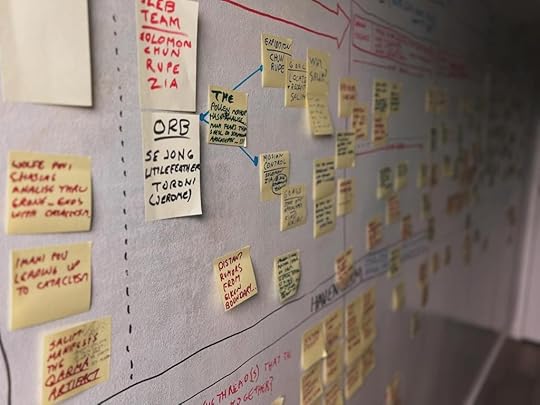 New LONGSTAR Cover?
New LONGSTAR Cover?7/9/2024: We’re looking at a cover art redesign for LONGSTAR to make it both more intriguing and better aligned with the graphic theme established by the cover art for GRONE. Here’s the lead contender so far:
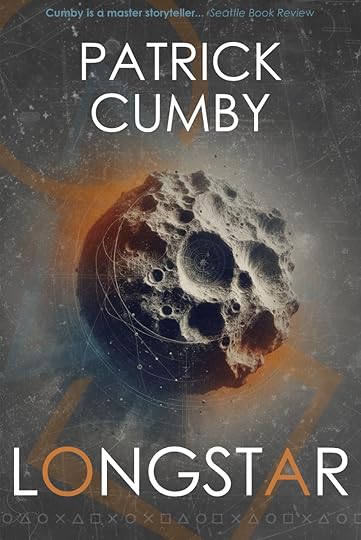 My fav meme.
My fav meme.7/8/2024: I made this meme several years ago when I first launched the Starships & Heroes FB page. It got shared a lot. I still see it surface every so often (like today). I wish I knew who took the original photo, because it is awesome and they deserve credit. If you know, please contact me.
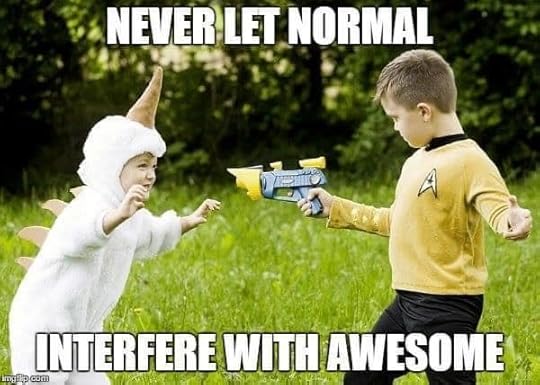 ORUS blurb draft, version 1.0
ORUS blurb draft, version 1.0Here’s my first attempt at writing a back-of-the-book blurb for ORUS, the upcoming GRONE sequel.
As a mysterious apocalypse looms, desperate scientists search for the one person who might stop it.Earthquakes span the globe. Aurora blaze in the night skies over Ecuador and Brazil. The sun is dimmed by an unprecedented plague of sunspots. Power grids are failing. Global climate is in deadly turmoil. And most terrifyingly, an apparition has appeared in the sky, bigger than the moon, a twisted topological impossibility that not a soul on Earth can bear to witness for more than a few seconds.
The cause of the chaos is known to only a handful of scientists sequestered in a lab at Stanford University. They’ve conducted a bold experiment with a new type of quantum computer, and now they’re dealing with the consequences of their actions. Somehow, impossibly, they’ve violated the laws of physics. The fabric of reality is quite literally being stretched to the point where the threads are starting to snap.
No one on the Stanford team truly understands the enigmatic technology that powers their QARMA supercomputer. All their work is based on the theories of one woman: Dr. Imani Salim, a renowned scientist who vanished years earlier, on the night before she was to receive the Nobel Prize for physics.
Can Imani Salim save the world?
Maybe, but they need to find her first.
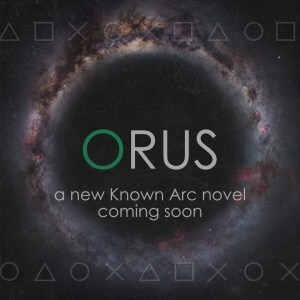 It’s starting to get real, y’all…
It’s starting to get real, y’all…7/6/2024: The GRONE sequel is starting to show signs of life…
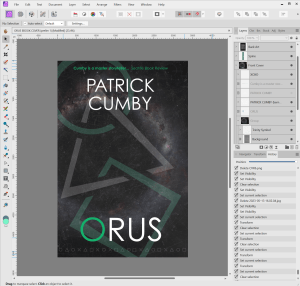 Where are the readers?
Where are the readers?7/5/2024: I recently started funneling my book sales through my author website so that I could get some insight into the folks who are buying/reading my books. The theory is, if I can understand who they are (gender/age/interests), maybe I can serve them better with my writing. One thing I never expected was to find a significant portion of my readership overseas. Here’s a world map from my website’s reporting tool (Google Analytics) showing book sales over the past month. The English speaking countries aren’t a huge surprise, but who knew we would have such strong sales in Germany? We also had a couple of readers in China, Thailand, Sweden, Brazil, Japan, a few Pacific Islands and what looks like Albania. What do we learn from this? Well, for starters, maybe a German translation is in order, and maybe we should target a few more book ads to Asia…
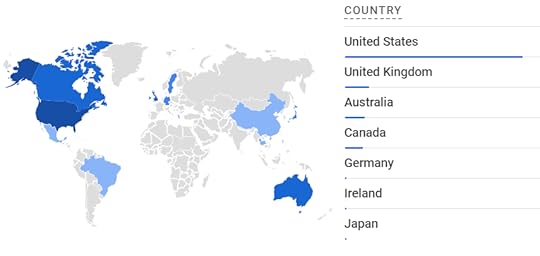 New Kindle Unlimited Ad Campaign Launching
New Kindle Unlimited Ad Campaign Launching7/3/2024: With the success of the GRONE audiobook campaign, I’m taking what I learned, namely that the more highly targeted your ads are, the more effective they are, and created a new campaign geared specifically for Kindle Unlimited readers. In case you don’t know, Kindle Unlimited (KU) is a subscription program Amazon offers that enables readers to read as many books as they want for a monthly fee. GRONE and LONGSTAR are both enrolled in the KU program, mainly because it’s a great way for new, unknown authors (like me) to get some exposure. KU readers can try new books, risk free, and if they don’t like them, they just move on. The KU program has been very good to me (so far), so we’ll see if this new batch of KU targeted ads will attract new readers.
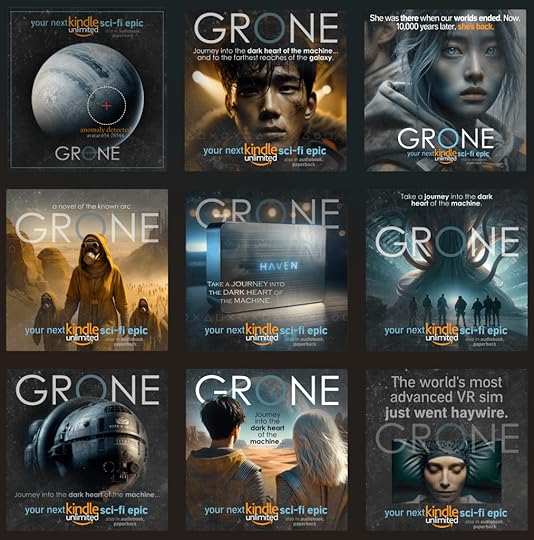 2 million page reads!
2 million page reads!7/1/2024: Hit 2 million pages read on Amazon’s Kindle Unlimited platform for GRONE and LONGSTAR. Thanks, readers, y’all are awesome!
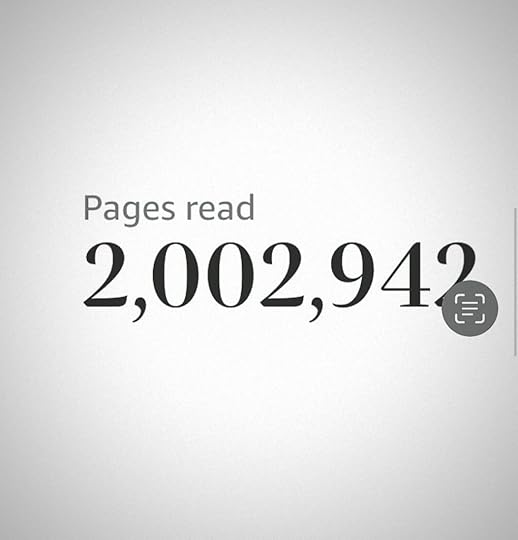 The 10,000th copy.
The 10,000th copy.6/29/2024: Proud to announce that today we hit 10,000 books sold since Grone was published last April (including audiobooks). The best part of the whole experience so far has been the interactions from readers all over the world, who have sent me so many encouraging messages and emails (and even a couple of old-fashioned snail-mail letters and a couple of very cool gifts). Thanks to all of you who have provided so much love and wonderful inspiration.
A little more than half the sales were in the USA, while the rest were split between the UK, Canada and Australia. Looking very much forward to finishing the sequel, ORUS, and getting it out there!
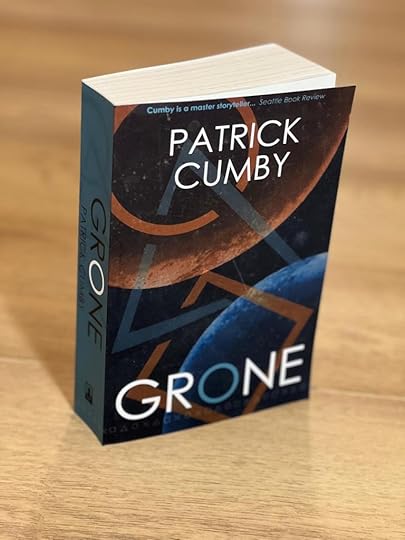 Getting reacquainted with Se Jong & Nkiru.
Getting reacquainted with Se Jong & Nkiru.6/26/2024: SE JONG AND NKIRU. I loved these characters in GRONE, and now that I’m in the middle of writing BOOK 2: ORUS, I love them even more. Will Se Jong find Nkiru, who was taken from him at the end of GRONE? That is still to be determined. ORUS is surprising me as I write it, and the twists just keep coming out of nowhere and dragging me into uncharted territory. I really hope the two of them reunite, but the Havencosm is a seriously messed up place, where nothing is ever as it seems and tragedy is quite literally designed into the fabric of reality.
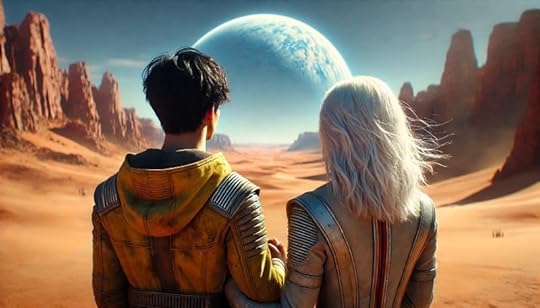 New PC sigil.
New PC sigil.6/21/2024: Updating my social media profiles, and instead of a goofy author photo, I’ve decided to try a simple sigil based on my initials (PC). We’ll see how it works going forward as a sort of branding exercise.
 Manhattan Book Review gives LONGSTAR a five star review.
Manhattan Book Review gives LONGSTAR a five star review.5/15/2024: The Manhattan Book Review just released a review of my latest novel LONGSTAR, giving it 5 stars and calling it “A fun read” and “Unconventionally epic.” So many thanks are due to all my beta readers and to everyone else who helped birth this beast.
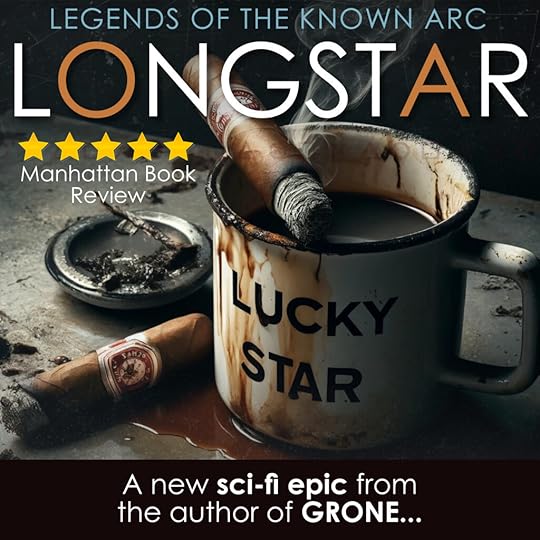 One and a half million pages for GRONE.
One and a half million pages for GRONE.4/6/2024: At lunch today GRONE hit a million-and-a-half pages read on the Kindle Unlimited ebook platform. Pretty cool!
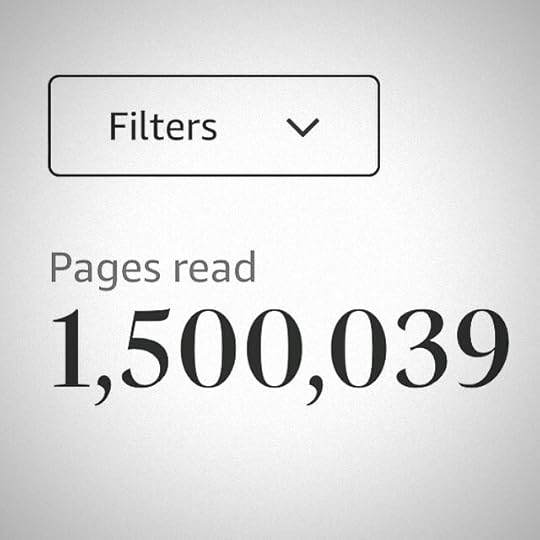 LONGSTAR is off to a good start.
LONGSTAR is off to a good start.2/13/2024: LONGSTAR is off to a good start, with a 4.8 rating on Amazon from the first batch of readers. Ads for the book started delivering this morning, and already today the book has exceeded 10,000 new page reads of the Kindle Unlimited ebook platform. Also got confirmation today that the Manhattan Book Review will be doing a review… fingers crossed!
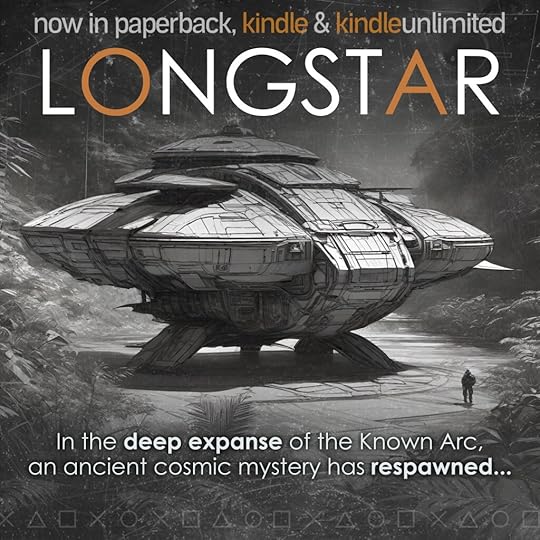 LONGSTAR launch.
LONGSTAR launch.1/31/2024: Don’t blink, it happens fast. Less than ONE MINUTE after the worldwide launch of LONGSTAR, almost a hundred of the preorders have already been fulfilled, and ONE reader has started the book and read ONE page so far. Launch day for a new book is nerve-wracking, especially when modern ebook technology allows you to see how many pages are being read in real-time. We’re chewing our nails.
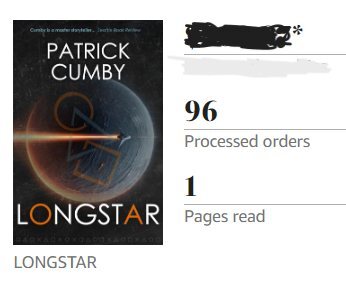 New books, new covers.
New books, new covers.1/31/2024: Look what came in the mail today, y’all!
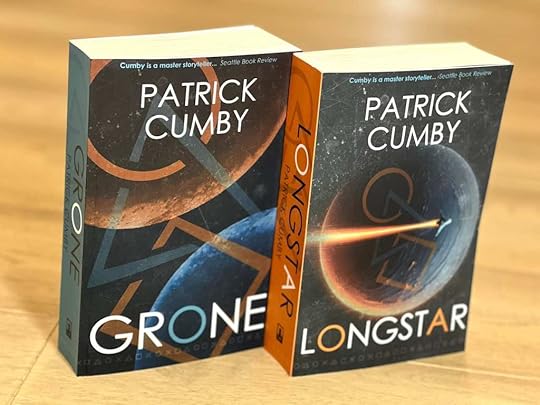 It’s coming ALIVE!
It’s coming ALIVE!1/27/2024: It’s coming ALIVE! This morning, a cascade of emails from Amazon approving the release of LONGSTAR on their platform next Wednesday.
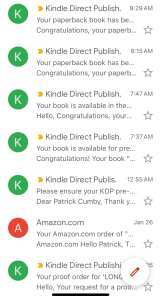 T-5 days.
T-5 days.1/26/2024: T-5 days… Trade paperback cover reveal! Early reviews starting to come in… looks like we’re go for a launch!
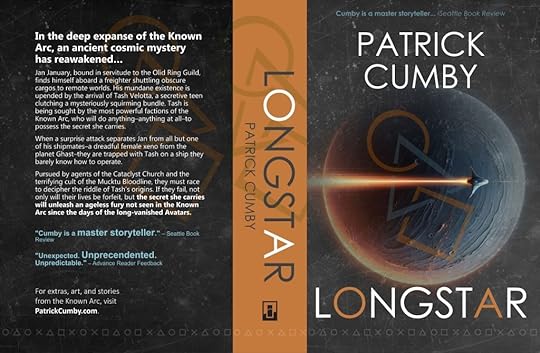 New covers.
New covers.1/21/2024: After agonizing for weeks over a million options and variations (several of which I’ve shared), here’s the cover reveal for my upcoming book LONGSTAR, plus the new-and-improved cover for GRONE. There may be a few last minute tweaks, but the final book covers should look very much like these. Now to get the finishing touches on the manuscript, thanks to the beta readers!
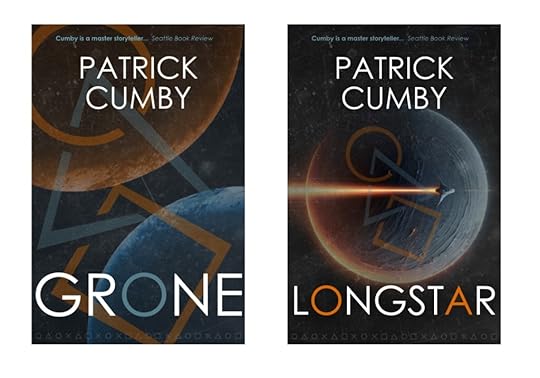 Beta reader feedback complete.
Beta reader feedback complete.1/19/2024: Final beta reader feedback from advance copies of LONGSTAR is almost complete. We’ve interviewed advance readers from USA, UK, Canada, Australia, and the consensus so far is that LONGSTAR is ready for publication. Getting excited!
Wow, y’all the beta reader feedback is *tremendously* useful and VERY high quality. Y’all are all really smart and perceptive people and your suggestions, criticisms, and comments are 100% absolutely spot on. I’m humbled and very honored by your help…it’s truly fun to be in the company of great readers who love books!
New cover concepts?1/15/2024: Experimenting with a whole new cover art strategy for the Known Arc books. The idea is to make them all have the same look and feel for branding purposes and to attract only those readers who like epic/space opera genre sci fi. There are early concepts, but I like the general direction.
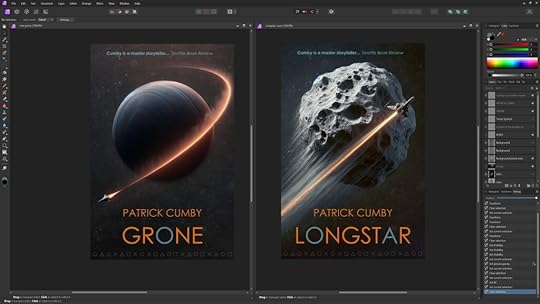 Fan art!
Fan art!1/1/2024: Check out this art from a fan! A hand-forged iron Linked Trinity symbol from GRONE! So freaking cool!
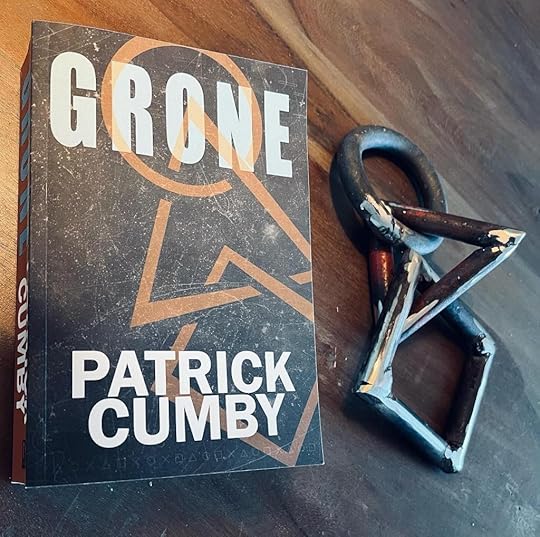 A new year, a new project.
A new year, a new project.1/1/2024: From this day forward, I’ll keep a running journal about writing and publishing my books.
GRONE gets recognized.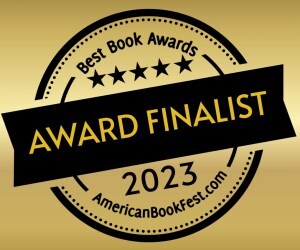
GRONE has been selected as a finalist for the 2023 BEST BOOK AWARDS by the American Book Festival in the science fiction category!
Audiobook released.GRONE is now an audiobook! The amazing voice talents of our narrators Jennifer Jill Araya and Nikola Hamilton are on high display with their performances. Jennifer is an Audie Award winning performer who really brings my characters to life. Nikola is a producer and engineer whose dulcet voice is absolutely enthralling. Check it out: the GRONE audiobook is available on Amazon, Audible, and Apple Books.
GRONE garners five-star reviews from Kirkus and Seattle Book Review
6/2023: GRONE has earned praise and five star reviews from both Kirkus Reviews and the Seattle Book Review!
“Kinetic and sharply written.”
-Kirkus
“An absolute masterpiece of science fiction.”
-Seattle Book Review
4/2023: My debut novel GRONE was just released from Broken Monolith Press. Get it now, or hear what critics and reviewers are saying.
I got an award.5/2023: I’m honored to be the First Place recipient of the 2023 Chapter One Prize for fiction!
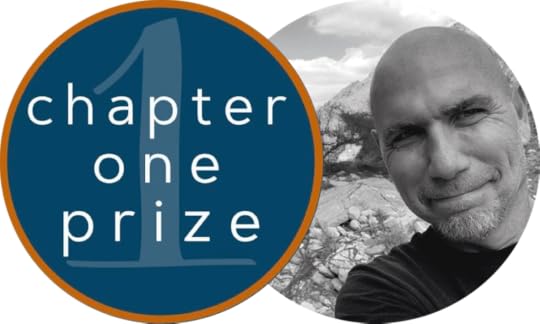
July 3, 2024
Latest news from my desk.
Hi! This post, which I keep pinned to the top of my blog, is an informal stream-of-consciousness series of updates about my works-in-progress and other aspects of the writing (and publishing) life. I try to keep it spoiler free, but every so often a minor spoiler might slip through unintentionally.
So, if you’ve ever wondered what’s going through a sci-fi author’s head as they plan, write, and market their books, here you go.
New Kindle Unlimited Ad Campaign Launching7/3/2024: With the success of the GRONE audiobook campaign, I’m taking what I learned, namely that the more highly targeted your ads are, the more effective they are, and created a new campaign geared specifically for Kindle Unlimited readers. In case you don’t know, Kindle Unlimited (KU) is a subscription program Amazon offers that enables readers to read as many books as they want for a monthly fee. GRONE and LONGSTAR are both enrolled in the KU program, mainly because it’s a great way for new, unknown authors (like me) to get some exposure. KU readers can try new books, risk free, and if they don’t like them, they just move on. The KU program has been very good to me (so far), so we’ll see if this new batch of KU targeted ads will attract new readers.
 2 million page reads!
2 million page reads!7/1/2024: Hit 2 million pages read on Amazon’s Kindle Unlimited platform for GRONE and LONGSTAR. Thanks, readers, y’all are awesome!
 The 10,000th copy.
The 10,000th copy.6/29/2024: Proud to announce that today we hit 10,000 books sold since Grone was published last April (including audiobooks). The best part of the whole experience so far has been the interactions from readers all over the world, who have sent me so many encouraging messages and emails (and even a couple of old-fashioned snail-mail letters and a couple of very cool gifts). Thanks to all of you who have provided so much love and wonderful inspiration.
A little more than half the sales were in the USA, while the rest were split between the UK, Canada and Australia. Looking very much forward to finishing the sequel, ORUS, and getting it out there!
 Getting reacquainted with Se Jong & Nkiru.
Getting reacquainted with Se Jong & Nkiru.6/26/2024: SE JONG AND NKIRU. I loved these characters in GRONE, and now that I’m in the middle of writing BOOK 2: ORUS, I love them even more. Will Se Jong find Nkiru, who was taken from him at the end of GRONE? That is still to be determined. ORUS is surprising me as I write it, and the twists just keep coming out of nowhere and dragging me into uncharted territory. I really hope the two of them reunite, but the Havencosm is a seriously messed up place, where nothing is ever as it seems and tragedy is quite literally designed into the fabric of reality.
 New PC sigil.
New PC sigil.6/21/2024: Updating my social media profiles, and instead of a goofy author photo, I’ve decided to come up with a simple sigil based on my initials (PC). We’ll see how it works going forward as a sort of branding exercise.
 Manhattan Book Review gives LONGSTAR a five star review.
Manhattan Book Review gives LONGSTAR a five star review.5/15/2024: The Manhattan Book Review just released a review of my latest novel LONGSTAR, giving it 5 stars and calling it “A fun read” and “Unconventionally epic.” So many thanks are due to all my beta readers and to everyone else who helped birth this beast.
 One and a half million pages for GRONE.
One and a half million pages for GRONE.4/6/2024: At lunch today GRONE hit a million-and-a-half pages read on the Kindle Unlimited ebook platform. Pretty cool!
 LONGSTAR is off to a good start.
LONGSTAR is off to a good start.2/13/2024: LONGSTAR is off to a good start, with a 4.8 rating on Amazon from the first batch of readers. Ads for the book started delivering this morning, and already today the book has exceeded 10,000 new page reads of the Kindle Unlimited ebook platform. Also got confirmation today that the Manhattan Book Review will be doing a review… fingers crossed!
 LONGSTAR launch.
LONGSTAR launch.1/31/2024: Don’t blink, it happens fast. Less than ONE MINUTE after the worldwide launch of LONGSTAR, almost a hundred of the preorders have already been fulfilled, and ONE reader has started the book and read ONE page so far. Launch day for a new book is nerve-wracking, especially when modern ebook technology allows you to see how many pages are being read in real-time. We’re chewing our nails.
 New books, new covers.
New books, new covers.1/31/2024: Look what came in the mail today, y’all!
 It’s coming ALIVE!
It’s coming ALIVE!1/27/2024: It’s coming ALIVE! This morning, a cascade of emails from Amazon approving the release of LONGSTAR on their platform next Wednesday.
 T-5 days.
T-5 days.1/26/2024: T-5 days… Trade paperback cover reveal! Early reviews starting to come in… looks like we’re go for a launch!
 New covers.
New covers.1/21/2024: After agonizing for weeks over a million options and variations (several of which I’ve shared), here’s the cover reveal for my upcoming book LONGSTAR, plus the new-and-improved cover for GRONE. There may be a few last minute tweaks, but the final book covers should look very much like these. Now to get the finishing touches on the manuscript, thanks to the beta readers!
 Beta reader feedback complete.
Beta reader feedback complete.1/19/2024: Final beta reader feedback from advance copies of LONGSTAR is almost complete. We’ve interviewed advance readers from USA, UK, Canada, Australia, and the consensus so far is that LONGSTAR is ready for publication. Getting excited!
Wow, y’all the beta reader feedback is *tremendously* useful and VERY high quality. Y’all are all really smart and perceptive people and your suggestions, criticisms, and comments are 100% absolutely spot on. I’m humbled and very honored by your help…it’s truly fun to be in the company of great readers who love books!
New cover concepts?1/15/2024: Experimenting with a whole new cover art strategy for the Known Arc books. The idea is to make them all have the same look and feel for branding purposes and to attract only those readers who like epic/space opera genre sci fi. There are early concepts, but I like the general direction.
 Fan art!
Fan art!1/1/2024: Check out this art from a fan! A hand-forged iron Linked Trinity symbol from GRONE! So freaking cool!
 A new year, a new project.
A new year, a new project.1/1/2024: From this day forward, I’ll keep a running journal about writing and publishing my books.
June 11, 2024
My ideal readers are terrifying.
Playwrights and screenwriters write for a medium where the enjoyment of their work is shared by a mass audience, the folks in the theater, who eat popcorn and experience the magic of the production together as a group.
An author writing a book is a different matter. A book is not like a theatrical production or a movie. A book has the smallest audience possible: an audience of one.
The reader.
It’s an intimate relationship. Writing a novel is a partnership between just two people: the writer and the reader. But before a writer can enter into a partnership with a reader, they need to know the reader—what the reader likes, what they love, and what they hate. Love and hate are tools that the novelist uses to reach the reader’s emotions. If the writer doesn’t know what their reader loves and hates, they can’t effectively find the reader’s soul and touch it with their prose.
Stephen King says he writes each and every one of his books for one person: his wife Tabitha. “I think that every novelist has a single ideal reader; that at various points during the composition of a story, the writer must consider, ‘I wonder what she will think when she reads this part?’”
Similarly, John Steinbeck advised writers, “Forget your generalized audience. In the first place, the nameless, faceless audience will scare you to death and in the second place, unlike the theater, it doesn’t exist. In writing, your audience is one single reader. I have found that sometimes it helps to pick out one person—a real person you know, or an imagined person, and write to that one.”
The whole concept of the ideal reader blew me away when I first learned of it, because Steinbeck was right, trying to write to satisfy everybody is an exercise in impossibility. You can never succeed. But writing for just one person, well, that’s a lot easier. The opinions and reactions of an ideal reader can help shape an author’s writing voice, guide their narrative, and influence the way they tell their stories.
For many novelists, including yours truly, the ideal reader is a shadowy figure who stands behind them while they write, peering over their shoulder, judging every sentence and every word. The ideal reader is both a source of inspiration and a terrible critic, pushing writers to do their best work while also forcing them to second-guess their choices.
Yes, it’s a little creepy. But novelists are, by definition, a little insane, so it goes with the territory.
It took me a long time to decide who my ideal reader was. I tried to imagine a fourteen year old teen, like myself, at the age where I first read Lord of the Rings and was swept away. But it didn’t seem right to use myself as my ideal reader. After all, I might go easy on myself, and that’s not the purpose of an ideal reader.
In the end, I decided on not one, but three ideal readers, each with their own set of exacting standards and expectations. One would have to search far and wide to find a more difficult trio of readers to satisfy, but I am a glutton for punishment. They are:
J.R.R. Tolkien, Arthur C. Clarke, and Ursula K. Le Guin.
Except not when they were old and established, but when they were young readers, before they became giants of literature. Everything I write, I write to entertain young Tolkien, Clarke, and Le Guin. I work incredibly hard to write stuff I truly hope that they might enjoy.
To satisfy Clarke, who was a seminal master of hard sci-fi, I try my best to write with scientific accuracy, to the best of my understanding, and to present new scientific ideas so that they have as solid a basis in real science as possible.
To satisfy Tolkien, who is to me the undisputed master of worldbuilding and, arguably, epic story structure, I try to create characters that are deeply rooted in the worlds they inhabit, and where the worlds themselves have such a depth of landscape and histories that they become characters of the story, too.
To satisfy Le Guin, who was a master of subtle, socially conscious sci-fi, I strive to portray my imaginary worlds in such a way as they might shed a different light on our contemporary experience and maybe give readers a new perspective on the modern-day, real-world in which they live.
Let’s be real, though. I know I can never dream of approaching the quality of their writing, nor their inventiveness. But just having them looking over my shoulder while I write, listening to their whispers as they judge my words and sentences and ideas, makes me a better writer. I’ve read everything they’ve written, more than once. I’ve been locked in the telepathic author-reader link that can only come from reading with all three of them, so many times that I feel an intimate kinship. I feel like I know them as well, or even better, than most of my real-life friends.
See, I told you it was a little creepy. But it’s also kind of wonderful.
I actually met Ursula Le Guin in 1975, when I was thirteen years old. I was attending my first ever sci-fi convention, and she was one of the featured guests. I remember hurrying into the hotel ballroom to see her speak. I was late when I arrived, and the only seat left was in the back row, far from the podium, next to a nice lady with a mushroom-top of short-cropped graying hair. I was a shy kid, but I was excited, so when she said, “Hi,” my mouth started blabbering about how amazing it was to actually get to see a real-live author in person. The lady asked me what Le Guin books I’d read. I told her I’d read “The Left Hand of Darkness” and “The Word for World is Forest.” She asked me which I liked the best, and I told her “Forest.” She asked me what I liked about it, but before I could answer, the announcer came to the stage and called the crowd to order. At that moment, the nice lady sitting next to me gave me a smile, stood, tousled my hair, and walked all the way up the center aisle to the stage.
I’d been sitting next to—and talking to—Ursula K. Le Guin herself. I was so flabbergasted that I can’t remember a single thing she said in her talk. I probably wasn’t even listening. My mind was completely short-circuited.
More recently, in March 2020, I visited Arthur C. Clarke in Colombo, Sri Lanka. At the time of my visit, he’d been dead for twelve years, but that hardly diminished my excitement. I’d been stuck in a Sri Lankan apartment for a month-long quarantine during a bout of the original version of COVID. Once the quarantine was over, on the first day I felt able, I went looking for Mr. Clarke’s grave. It was not easy to find. I was hoping for a tall black monolith like the one from his masterpiece “2001: A Space Odyssey” as his gravestone, but it turned out that his grave was modest, tucked in a row of other graves with no special distinction. I spent a long time with Mr. Clarke in quiet contemplation of his legacy. His writing altered the course of the lives of millions of readers, including me. His humanist brand of sci-fi made incredibly exciting futures seem not only possible, but plausible. He altered everyone’s lives, actually, including yours—in addition to his writing, he’s the man who invented the concept of the geosynchronous communications satellite. We might not have global communications today without Clarke.
I never met J.R.R. Tolkien, but I did once have a Tolkien-legacy experience when hiking in a dense copse of woods near his beloved Oxford University in England. As soon as the trail entered the wood, I instantly experienced a powerful feeling of déjà vu. This feeling only increased the deeper I moved into the dark wood. The trail was narrow, the canopy dense, and the trees leaned close, their limbs tearing at my clothes. I even remember thinking to myself, “this place is positively Tolkienesque.” Sure enough, upon exiting the copse, I found a sign proclaiming that the woods I’d just passed through were a favorite walking spot for Professor Tolkien, and many believe they were his inspiration for the Old Forest, which appears in “The Fellowship of the Ring.”
Writing for such a trio of ideal readers might sound like a daunting task, but it’s also an incredibly rewarding one. The challenge of trying to meet the high standards set by Clarke, Tolkien, and Le Guin forces me to stretch my imagination and hone my craft. Their ghostly approval (or disapproval) serves as a North Star, guiding me through the storms of the creative process.
Sure, it might be a little unsettling having three literary legends, all of them dead, looking over my shoulder in a small room for hours on end. But, hey, it’s not like they’re going to jump out and shout “Boo!” (I hope). I mean, if anyone catches me talking to myself, I’ll just say I’m having an intense brainstorming session with my esteemed panel of critics. Nothing weird about that, right?
In the end, my spectral critics keep me grounded and motivated. They remind me that while writing is a solitary endeavor, it’s ultimately about connecting with someone else on a deeply personal level. And though my ideal readers might be figments of my imagination, their influence is very real.
So, here’s to writing for the audience of one—or three —who make every word worthwhile.
And if anyone asks why I leave the light on when I write, I’ll just nod and smile nervously…
June 8, 2024
Timestream Discontinuity Converter: Meatspace vs. Havencosm
Here’s a fun computational tool I created to help visualize the implications of the Timestream Discontinuity between the real world (Meatspace) and the malfunctioning virtual world (Havencosm) as depicted in my novels GRONE, LONGSTAR, and the upcoming books ORUS and PHADE.
If you’ve read GRONE, you know that time inside the Havencosm elapses 122,000 times faster than time here in the real world of Meatspace. This means that for every hour that passes on a clock in Meatspace, almost 14 years pass in the Havencosm. Imagine the implications: for every month that passes for us, 10,000 years elapse inside the Havencosm.
Using the tool is simple: just enter a numeric value in one of the input boxes, select the unit you wish to convert from (seconds, minutes, hours, days, or years), and tap the Convert button.
Time Converter body { font-family: Arial, sans-serif; background-color: #f4f4f9; } .container { max-width: 600px; margin: 0 auto; padding: 20px; } .converter { background-color: #fff; padding: 20px; border: 1px solid #ccc; border-radius: 8px; margin-bottom: 20px; } .converter label { display: block; margin-bottom: 5px; font-weight: bold; } .converter input, .converter select { width: 100%; padding: 8px; margin-bottom: 10px; box-sizing: border-box; border: 1px solid #ccc; border-radius: 4px; } .result { font-weight: bold; margin-top: 10px; } h1, h2 { text-align: center; } button { background-color: #007bff; color: white; border: none; padding: 10px 20px; cursor: pointer; border-radius: 4px; } button:hover { background-color: #0056b3; } Meatspace to Havencosm Enter duration in Meatspace: Seconds Minutes Hours Days Years Convert Havencosm to Meatspace Enter duration in Havencosm: Seconds Minutes Hours Days Years Convert const conversionFactor = 121667; function convertToHavencosm() { let meatspaceDuration = parseFloat(document.getElementById('meatspaceDuration').value); let meatspaceUnit = document.getElementById('meatspaceUnit').value; let meatspaceDurationInSeconds; switch (meatspaceUnit) { case 'seconds': meatspaceDurationInSeconds = meatspaceDuration; break; case 'minutes': meatspaceDurationInSeconds = meatspaceDuration * 60; break; case 'hours': meatspaceDurationInSeconds = meatspaceDuration * 3600; // 60 * 60 break; case 'days': meatspaceDurationInSeconds = meatspaceDuration * 86400; // 60 * 60 * 24 break; case 'years': meatspaceDurationInSeconds = meatspaceDuration * 31536000; // 60 * 60 * 24 * 365 break; } let havencosmDurationInSeconds = meatspaceDurationInSeconds * conversionFactor; displayResults(havencosmDurationInSeconds, 'havencosmResult'); } function convertToMeatspace() { let havencosmDuration = parseFloat(document.getElementById('havencosmDuration').value); let havencosmUnit = document.getElementById('havencosmUnit').value; let havencosmDurationInSeconds; switch (havencosmUnit) { case 'seconds': havencosmDurationInSeconds = havencosmDuration; break; case 'minutes': havencosmDurationInSeconds = havencosmDuration * 60; break; case 'hours': havencosmDurationInSeconds = havencosmDuration * 3600; // 60 * 60 break; case 'days': havencosmDurationInSeconds = havencosmDuration * 86400; // 60 * 60 * 24 break; case 'years': havencosmDurationInSeconds = havencosmDuration * 31536000; // 60 * 60 * 24 * 365 break; } let meatspaceDurationInSeconds = havencosmDurationInSeconds / conversionFactor; displayResults(meatspaceDurationInSeconds, 'meatspaceResult'); } function displayResults(timeInSeconds, resultElementId) { let seconds = timeInSeconds.toFixed(5); let minutes = (timeInSeconds / 60).toFixed(5); let hours = (timeInSeconds / 3600).toFixed(5); let days = (timeInSeconds / 86400).toFixed(5); // 60 * 60 * 24 let years = (timeInSeconds / 31536000).toFixed(5); // 60 * 60 * 24 * 365 let resultText = ` <p>Seconds: ${seconds}</p> <p>Minutes: ${minutes}</p> <p>Hours: ${hours}</p> <p>Days: ${days}</p> <p>Years: ${years}</p> `; document.getElementById(resultElementId).innerHTML = resultText; } Common Discontinuity Values121,667 = timestream multiplier (how much faster time runs in the Havencosm than in Meatspace).
On Earth In Haven 30 days 10,000 years 1 day 333.3 years 1 hour 13.9 years 1 minute 84.5 days 1 minute 2.8 months 1 second 33.8 hours 1 second 1.4 days 17 hours 236.1 years On Earth In Haven 4.3 minutes 1 year 21.6 seconds 1 month 5.0 seconds 1 week 7.2 hours 100 years 3.0 days 1000 years 30 days 10,000 years 1 month 10,000 years More Calculations 30 days 3,650,000.0 days 1 day 121,666.7 days 720 hours 87,600,000.0 hours 1 hour 121,666.7 hours 1 hour 5,069.4 days 60 minutes 121,666.7 hours 1 minute 2,027.8 hours 0.00001 year 1 year 0.00300 days 1 year 0.07200 hours 1 year 0.4 minutes 1 month 0.7 seconds 1 dayJanuary 24, 2024
LONGSTAR Easter Eggs
As you journey through the Known Arc within the pages of LONGSTAR, be sure to keep a keen eye and inquisitive mind, because there are a few little surprises that will beckon to those who possess a deep understanding of science fiction’s rich history. Woven seamlessly into LONGSTAR’s narrative, these Easter eggs are elusive, whimsical, and require an intrepid sense of nerdy exploration to uncover. They are my way of paying homage to the beloved classics and pop culture references that have shaped the sci-fi genre. They won’t distract from the story, and if you aren’t looking for them you’ll never know they are there.
Spotting these Easter Eggs requires a touch of literary archaeology, a dash of curiosity, and a prodigiously deep nerdiness. They might be concealed in the whispers of forgotten avatars, the echoes of ancient memories, and the resonance of alien languages. To unearth them requires more than casual observation; it demands the keen instincts of a true geek connoisseur. A few are easy to spot. Most are not.
Don’t make a special effort to try to find the Easter eggs, just be aware that they exist. If you do happen to recognize one while you’re reading, give a little chuckle and move on with the story. They aren’t meant to be distracting. They’re meant to be fun.
Your curiosity is the compass, and the universe of the Known Arc is your playground. Have fun and enjoy LONGSTAR!
My regards,
Patrick





